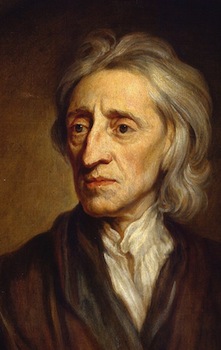SECTION II: What is the Self?
Reading 4: from Locke's Essay Concerning Human Understanding
In our fourth reading on the topic of the human self, John Locke undertakes an empiricist's investigation of the self, revealing features similar to but also different from those found by the rationalist, Descartes. |
|
"We must consider what person stands for;—which, I think, is a thinking intelligent being, that has reason and reflection, and can consider itself as itself, the same thinking thing, in different times and places; which it does only by that consciousness which is inseparable from thinking, and, as it seems to me, essential to it: it being impossible for any one to perceive without perceiving that he does perceive."
|
John Locke by Godfrey Kneller, 1697 |
|
|
Go on to the next reading, Hume's Treatise. |
|
Go back to Descartes's Meditations. |
|

